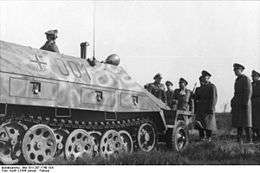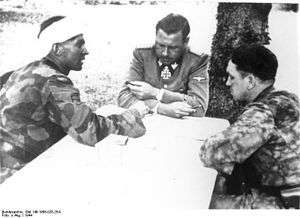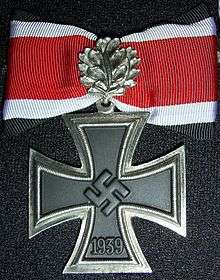Fritz Witt
| Fritz Witt | |
|---|---|
|
Witt (centre) with Max Wünsche (left) and Kurt Meyer (right). France, 1944 | |
| Born |
27 May 1908 Hohenlimburg, German Empire |
| Died |
14 June 1944 (aged 36) Venoix, Normandy, Occupied France |
| Buried at | Champigny-Saint-André German war cemetery |
| Allegiance |
|
| Service/branch |
|
| Years of service | 1933–44 |
| Rank | SS-Brigadeführer and Generalmajor of the Waffen-SS |
| Service number |
NSDAP #816,769 SS #21,518 |
| Commands held | SS Division Hitlerjugend |
| Battles/wars | |
| Awards | Knight's Cross of the Iron Cross with Oak Leaves |
Fritz Witt (27 May 1908 – 14 June 1944) was a high-ranking commander in the Waffen-SS, the paramilitary branch of the Nazi Party's Schutzstaffel (SS). He served with the SS Division Leibstandarte before taking command of the SS Division Hitlerjugend. He was killed in action in June 1944.
Early life and career
Born in 1908 into a family of a merchant, Witt worked in the textile industry until he lost his job in June 1931.[1] Witt joined the Nazi Party (NSDAP) (Nr. 816,769) in December 1931 and the SS (Nr. 21,518).[2] Witt became a member of the SS-Stabswache "Berlin" in March 1933, a unit renamed to SS-Sonderkommando "Berlin" in September. In October, Witt was promoted to SS-Sturmführer and appointed platoon leader.[1] The unit was the nucleus of the later SS Division Leibstandarte (LSSAH).[3] In January 1935, Witt was appointed company commander in the SS-Standarte "Deutschland", a unit that later became part of the SS Division Das Reich.[1]
World War II
Witt participated in the Invasion of Poland in September 1939 as a member of the motorized infantry regiment "Deutschland", which was subordinated to Panzer Division Kempf, a combined arms unit commanded by General Werner Kempf. Witt's unit took part in the Battle of the Border which included the Battle of Mława (1–3 September 1939) and the Battle of Modlin (13–29 September 1939), being awarded the Iron Cross 2nd Class on 17 September 1939. Witt also fought at Zakroczym where men from Panzer Division Kempf committed the Massacre in Zakroczym on 28 September 1939.[1][4] On 26 September 1939, Witt was awarded the Iron Cross 1st Class.[5]
Battle of France and Greece
Following the Invasion of Poland, the SS-Regiment "Deutschland" was one of three regiments of the SS-Verfügungstruppe (SS-VT) and later became the SS Division Das Reich. On 19 October 1939, Witt was appointed to command a battalion in the SS-Standarte "Deutschland", with which he participated in the Battle of the Netherlands and the Battle of France.[5]
On 4 September 1940, Witt was awarded the Knight's Cross of the Iron Cross. He was then transferred back to the LSSAH on 16 October 1940, where he was appointed a battalion commander. At the time, the battalion was based in Metz, France and was being augmented to a motorized brigade.[5]
In early 1941, LSSAH relocated from Metz to Romania and in March 1941, it moved to Bulgaria. As battalion commander, Witt participated in the Battle of Greece (6–30 April 1941), the Axis invasion of the Allied Kingdom of Greece. On 11–12 April 1941, Witt's battalion participated in the assault on the Klidi Pass, sustaining heavy casualties in the attack. On 14 April 1941, the battalion fought against British forces in the Battle of Kleisoura Pass. There, Witt's brother, a member of the same unit, was killed in action.[6]
War against the Soviet Union
In preparation for Operation Barbarossa, the planned invasion of the Soviet Union, the LSSAH was moved to the Czech Republic.[7] As part of Army Group South, the LSSAH took part in the Battle of Uman and the subsequent Battle of Kiev (1941). According to a postwar account of a Waffen-SS journalist, after finding the mutilated bodies of six dead divisional members who had been previously captured and executed in Taganrog, the division murdered 4,000 Soviet prisoners in reprisal. For want of reliable evidence, the allegations remained unproven.[8]
SS Division Hitlerjugend

On 1 July 1943, Witt was promoted to SS-Oberführer and was appointed commander of the 12th SS Panzer Division Hitlerjugend, the majority of its enlisted men were drawn from members of the Hitler Youth. His previous command of the SS-Panzergrenadier-Regiment 1 was given to Albert Frey. In the following months, Witt oversaw the formation and training of Hitlerjugend division at Beverloo Camp, Belgium.[9]
In expectation of the Allied invasion, 12th SS Panzer Division Hitlerjugend was ordered to relocate to France in March 1944. On 1 April 1944, elements of the division were responsible for the Ascq massacre in Ascq, France. In command of these elements was SS-Obersturmführer Walter Hauck, at the time a company commander in the Hitlerjugend division.[10]
On 20 April 1944, Witt was promoted to SS-Brigadeführer und Generalmajor of the Waffen-SS.[11] On 6 June 1944, the Western Allies launched the Invasion of Normandy. During the Normandy Campaign, Kurt Meyer, commander of the Hitlerjugend 25th Panzer Grenadier Regiment, used the Ardenne Abbey for his regimental headquarters, as the turret allowed for a clear view of the battlefield.[12] On 7 June, members of the Hitlerjugend division under Kurt Meyer illegally executed Canadian soldiers in what became known as the Ardenne Abbey massacre.[13]
On 14 June 1944, Witt was killed in action by a Royal Navy naval artillery barrage which hit the divisional command post at Venoix. He was initially buried at Venoix and later reinterred at Champigny—Saint-André-de-l'Eure, France.[14]
Summary of SS career
- Decorations
- Iron Cross (1939) 2nd Class (17 September 1939) & 1st Class (26 September 1939)[15]
- German Cross in Gold on 8 February 1942 as SS-Obersturmbannführer in the SS-Division "Leibstandarte SS Adolf Hitler"[16]
- Knight's Cross of the Iron Cross with Oak Leaves
- Knight's Cross on 4 September 1940 as SS-Sturmbannführer and commander of the I./SS-Standarte "Deutschland".[17]
- 200th Oak Leaves on 1 March 1943 as SS-Standartenführer and commander of SS-Panzergrenadier-Regiment 1 "Leibstandarte SS Adolf Hitler"[17]
- Dates of rank
| 9 May 1934: | SS-Obersturmführer |
| 1 June 1935: | SS-Hauptsturmführer[1] |
| 17 May 1940: | SS-Sturmbannführer[5] |
| 27 November 1941: | SS-Obersturmbannführer[7] |
| 30 January 1943: | SS-Standartenführer[7] |
| 1 July 1943: | SS-Oberführer[9] |
| 20 April 1944: | SS-Brigadeführer and Generalmajor of the Waffen-SS[11] |
References
Citations
- 1 2 3 4 5 Stockert 2012, p. 389.
- ↑ Westfälische Forschungen, p. 370.
- ↑ Cook & Bender 1994, pp. 17, 19.
- ↑ Datner 1961, pp. 60–61.
- 1 2 3 4 Stockert 2012, p. 390.
- ↑ Stockert 2012, p. 391.
- 1 2 3 Stockert 2012, p. 392.
- ↑ Stein 1984, p. 133.
- 1 2 Stockert 2012, p. 394.
- ↑ Westemeier 2013, p. 300.
- 1 2 Stockert 2012, p. 395.
- ↑ Margolian 2000, p. 44.
- ↑ Birn 2006, p. 567.
- ↑ Stockert 2012, p. 396.
- ↑ Thomas 1998, p. 450.
- ↑ Patzwall & Scherzer 2001, p. 518.
- 1 2 Scherzer 2007, p. 791.
Bibliography
- Birn, Ruth Bettina (2006). "Spät, aber gründlich. Die Ermittlungen gegen Kriegsverbrecher in Kanada". In Frei, Norbert. Transnationale Vergangenheitspolitik. Der Umgang mit deutschen Kriegsverbrechern in Europa nach dem Zweiten Weltkrieg. Göttingen: Wallstein. ISBN 978-3-89244-940-9.
- Cook, Stan; Bender, Roger James (1994). Leibstandarte SS Adolf Hitler: Uniforms, Organization, & History. San Jose, CA: James Bender Publishing. ISBN 978-0-912138-55-8.
- Datner, Szymon (1961). Zbrodnie Wehrmachtu na jeńcach wojennych armii regularnych w II wojnie światowej [Crimes of the Wehrmacht: on regular army POWs in World War II] (in Polish). Warszawa, Poland: Wydawnictwo Ministerstwa obrony narodowej. OCLC 491616631.
- Margolian, Howard (2000) [1998]. Conduct Unbecoming: The Story of the Murder of Canadian Prisoners of War in Normandy. Toronto: University of Toronto Press. ISBN 978-0802083609.
- Patzwall, Klaus D.; Scherzer, Veit (2001). Das Deutsche Kreuz 1941 – 1945 Geschichte und Inhaber Band II [The German Cross 1941 – 1945 History and Recipients Volume 2] (in German). Norderstedt, Germany: Verlag Klaus D. Patzwall. ISBN 978-3-931533-45-8.
- Scherzer, Veit (2007). Die Ritterkreuzträger 1939–1945 Die Inhaber des Ritterkreuzes des Eisernen Kreuzes 1939 von Heer, Luftwaffe, Kriegsmarine, Waffen-SS, Volkssturm sowie mit Deutschland verbündeter Streitkräfte nach den Unterlagen des Bundesarchives [The Knight's Cross Bearers 1939–1945 The Holders of the Knight's Cross of the Iron Cross 1939 by Army, Air Force, Navy, Waffen-SS, Volkssturm and Allied Forces with Germany According to the Documents of the Federal Archives] (in German). Jena, Germany: Scherzers Miltaer-Verlag. ISBN 978-3-938845-17-2.
- Stein, George H. (1984). The Waffen SS: Hitler's Elite Guard at War, 1939–1945. Ithaca, NY: Cornell University Press. ISBN 978-0-8014-9275-4.
- Stockert, Peter (2012) [1997]. Die Eichenlaubträger 1939–1945 Band 2 [The Oak Leaves Bearers 1939–1945 Volume 2] (in German) (4th ed.). Bad Friedrichshall, Germany: Friedrichshaller Rundblick. ISBN 978-3-9802222-9-7.
- Thomas, Franz (1998). Die Eichenlaubträger 1939–1945 Band 2: L–Z [The Oak Leaves Bearers 1939–1945 Volume 2: L–Z] (in German). Osnabrück, Germany: Biblio-Verlag. ISBN 978-3-7648-2300-9.
- Stollberg-Rilinger, Barbara, ed. (2003). Westfälische Forschungen, Band 53 [Westphalian Research, Volume 53]. Münster, Germany: Aschendorff. ISBN 978-3-402-09232-3.
- Westemeier, Jens (2013). Himmlers Krieger: Joachim Peiper und die Waffen-SS in Krieg und Nachkriegszeit [Himmler's Warriors: Joachim Peiper and the Waffen-SS during the War and Post-War Period]. Paderborn, Germany: Ferdinand Schöningh. ISBN 978-3-506-77241-1.
| Military offices | ||
|---|---|---|
| Preceded by none |
Commander of 12th SS Panzer Division Hitlerjugend 24 June 1943 – 14 June 1944 |
Succeeded by SS-Brigadeführer Kurt Meyer |

